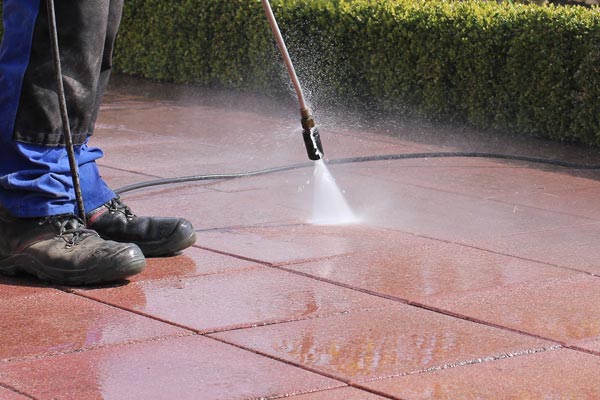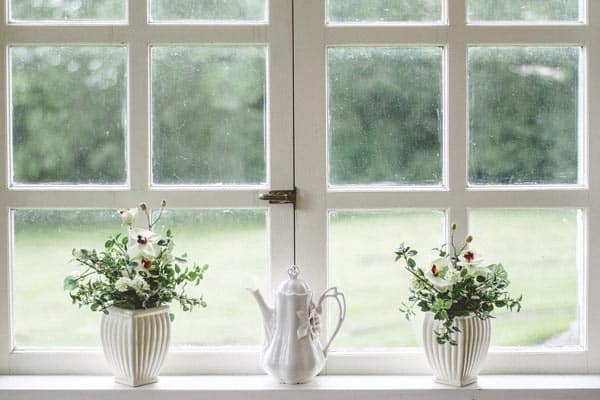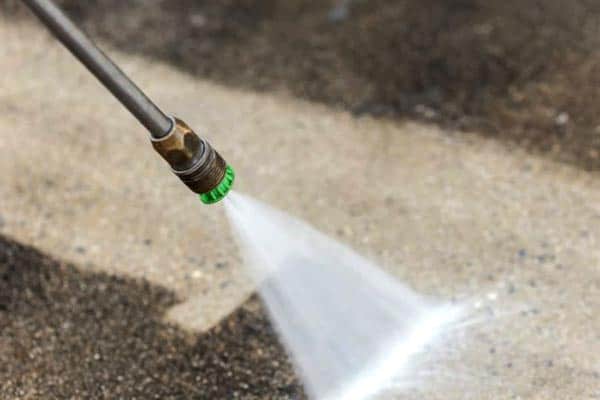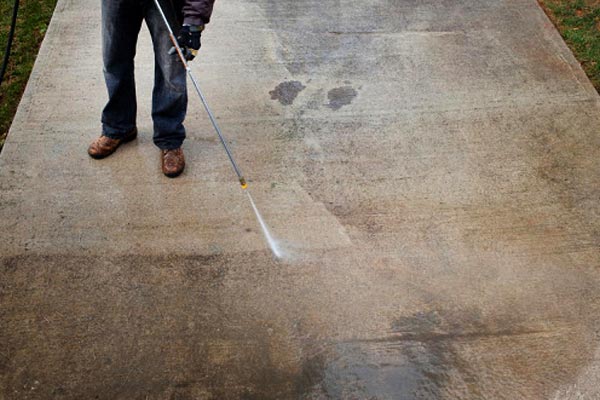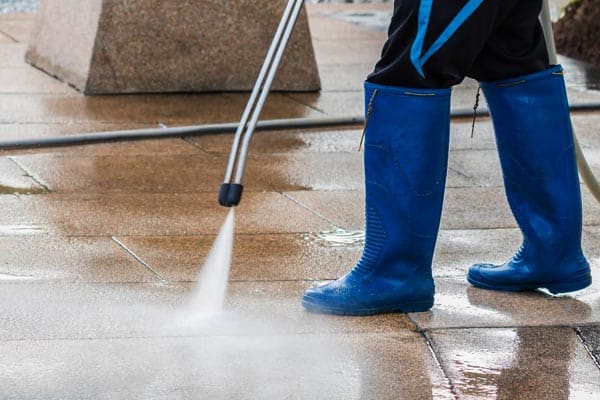Why Do Pressure Washers Overheat?
Your pressure washer is just like any other tool that has a list of things you can and can’t do with them to keep them in good working condition.
Anyone who uses these pressure washers in a commercial setting knows that they can break and be unfixable much quicker if you allow them to overheat or use them carelessly, and the same goes for residential-grade ones.
This is why it’s important to follow the user manual faithfully and figure out if your pressure washer can overheat.
Do Pressure Washers Overheat?
The short answer is that your pressure washer can overheat, and you really shouldn’t run the machine for more than five minutes at a continuous clip unless it’s a more durable professional-grade unit.
Leaving the pressure washer running for longer than this timeframe can result in it overheating and causing damage to the internal components.
Depending on the model, you’ll want to give it a resting period after each use for 10 to 15 minutes to allow the components to cool down to safer levels. There are also other factors that could cause your pressure washer to overheat, and we’ll outline all of them below.
The Main Reasons Why Your Pressure Washer Can Overheat
Each time your pressure washer overheats, you run the risk of severely damaging the components of the machine. So, it’s best to avoid the biggest reasons why they tend to overheat, and you can look at the shortlist below to get a good idea.
- Hot Water – Putting hot water into a pressure washer that only uses cold water is bad for the machine, and it can lead to overheating.
- Mechanical Problems – If you have a mechanical problem that you don’t address that involves the heating system, you could end up with excessive heat build-up inside the pressure washer.
- Not Enough Water – Always pump water into your pressure washer at the recommended gallons per minute listed on the manual. Look at the pump rating to get more concrete directions.
- Run Time – Leaving your residential-grade pressure washer running for more than five minutes at a continuous clip can cause it to overheat, and this can lead to pump damage.
- Fuel Issues – In pressure washers that run on gasoline, excessive pressure with the fuel will cause the internal temperature to rise. This is why you want to check the manufacturer’s fuel pressure recommendations before you switch it on and fuel up.
- Incorrect Usage – It’s very easy to wrongly set your unloader on your machine or not install the burner nozzle correctly, and this will cause the unit to overheat.
- Thermostat – Your machine’s thermostat can develop issues that allow the unit to get far too hot.
Do Electric Pressure Washers Overheat?
Electric pressure washers can overheat just like gas models can, and there are several reasons why. If you leave the unit run when you don’t use it, it can cause it to overheat and damage the pump.
A glitch in the power supply circuit is another issue that causes this type of pressure washer to get too hot.
Anything from faulty fuses to damaged capacitors can cause excess heat, and it also increases the chances of a person getting an electric shock.
If you can’t diagnose the issue yourself, you should consult a professional to see what’s wrong and how much it would cost to fix it.
How the Thermostat Regulates the Pressure Washer’s Temperature
A thermostat is a necessary component in almost all machines, and it helps to regulate the internal temperature, so it doesn’t go below or above the optimal ranges.
So, this is why it’s important to understand how your pressure washer’s thermostat works to help if you have to troubleshoot your machine if it overheats.
Pressure washers come with thermostats that are adjustable or non-adjustable, and it’s only natural that your water will eventually heat higher than the optimal level.
When heating persists, diagnosing your thermostat will help you confirm or deny a glitch in the system, and a fixed thermostat will keep the water at your desired temperature by cycling your machine’s burner nozzle on and off.
You want to set your thermostat at your desired temperature for the machine to operate at peak levels, and you shouldn’t worry if the temperature increases or decreases at certain points when you use it.
If you’re trying to get a constant water temperature, you have to reduce the heat output on your machine’s burner nozzle.
You have a whole new challenge if your pressure washer has a non-adjustable thermostat because the burner nozzle fires constantly, so it’s normal for the water temperature to increase at a specific rate when you use it.
If this happens, you have to trigger the safety switch to stop it from overheating, and it’ll automatically switch the machine off when you get to your preset water temperature.
Why It’s Bad to Keep a Pressure Washer Running
It’s bad to keep your pressure washer running for more than five minutes at a time, so if you can’t switch it off after a few minutes, you never want to leave it idle for them than five minutes at a maximum.
The temperature will build up if you leave your pressure washer running, and this can cause damage to the internal workings of your machine while increasing the chances of damaging the pump.
The trick with pressure washers is that pulling your gun’s trigger will ensure you get a constant flow of water into and from your pressure washer at the set gallons per minute, and a constant flow means that your inner components stay cooler at around 60-degrees while you use it.
Leaving the engine running when you push the trigger makes the flow stop, but it sends the water circulating in the pump under very high pressure because it bypasses the pump outlet. As the water circulates more, it heats up on each pass.
If you allow this to happen for more than five minutes, the machine will overheat and damage the unit from the recirculating water.
If this happens, it will cause instantaneous damage to the pump, and it can lead to a host of other issues, including:
- O-rings have faster wear and tear
- Valves can quickly distort
- Warping can happen on specific components, and it can focus on sides with lower pressures
- Water seals on the machine and pump will show more wear and tear than is normal for the amount you used so far
Why Does a Pressure Washer Smoke?
The pressure washer can start to smoke as the engine overheats because the motor winding insulation will melt before the motor shorts out. This causes an extra current to be produced, and this will cause smoke to appear.
The majority of pressure washers don’t last through their third year of use because of overheating the engine and overusing the machine.
Does Hot Water Negatively Impact a Pressure Washer?
As long as your pressure washer comes designed to use with hot water, it won’t have negative impacts to use it.
The materials the manufacturer uses and the machine’s design allows it to handle hotter temperatures without incurring damage. However, you never add overheated water from an internal source into your pressure washer.
Any manufacturer who designs pressure washers for use with hot water will outline the maximum temperature you can safely heat the water to before channeling it through the machine.
If you add water that is too hot, this can cause internal damage to the pressure washer.
Protecting Your Pressure Washer from Overheating
Damage from overheating can easily double how much it costs to repair and maintain your machine, so you really want to avoid doing it at all costs.
Along with not leaving your machine idling in bypass mode for more than a few minutes at a time, you should consider installing a thermal valve.
Your thermal valve opens up when the pump reaches 145-degrees, and this valve will release the heated water to allow cool, fresh water to go down into your machine’s system.
The thermal valve should reset every time it opens, and you want to double-check this to ensure it’s functioning correctly.
Also, you want to allow the machine to rest after using it for 5 to 10 minutes at a time because the engine heats up when the machine starts to generate more force.
Place the machine in a shaded area as much as you can because exposure to sunlight can also cause everything to heat up faster.
This is especially true for those people who have gas pressure washers because the fuel can also build up heat in the engine as it runs.
Bottom Line
Now you know that it’s relatively easy for pressure washers to overheat with extended use, and this can instantly cause catastrophic damage to your machine.
We recommend following the tips we outlined to prevent it from overheating and to extend the life of the pressure washer.
